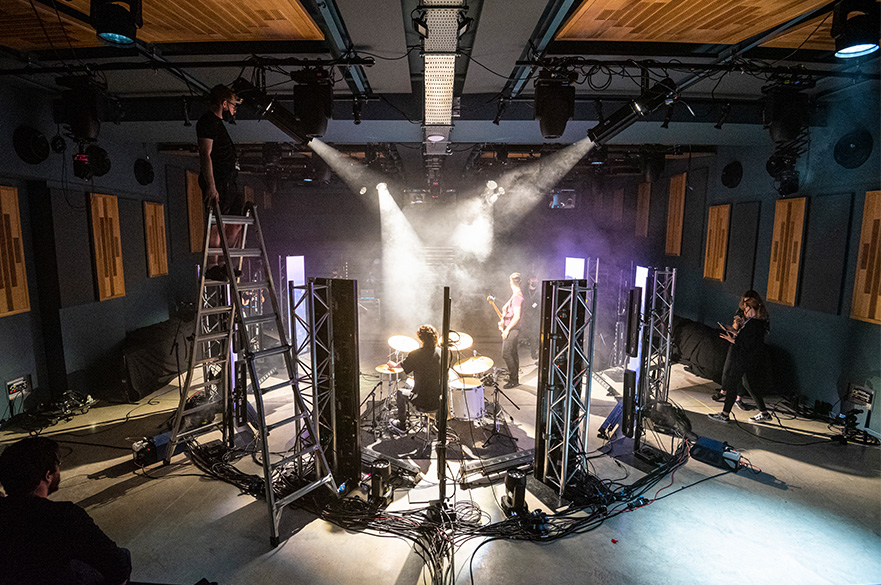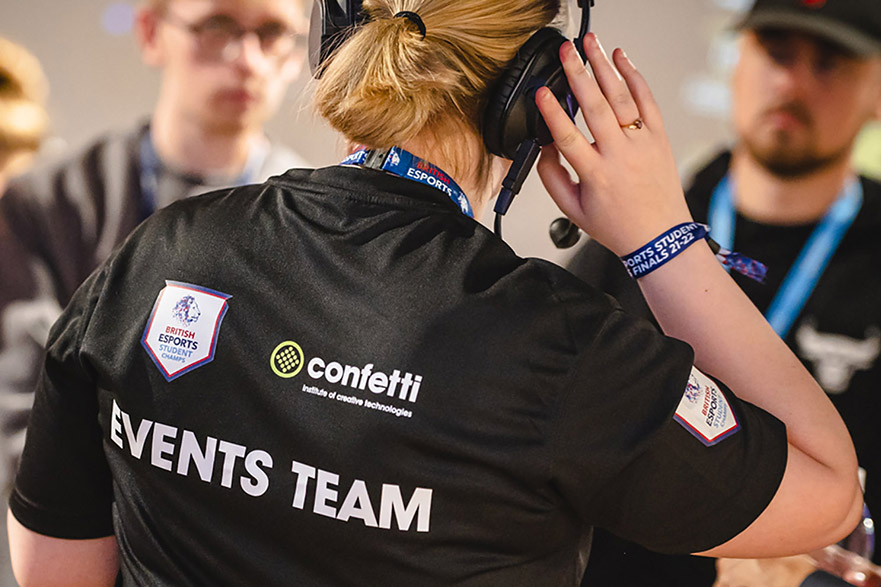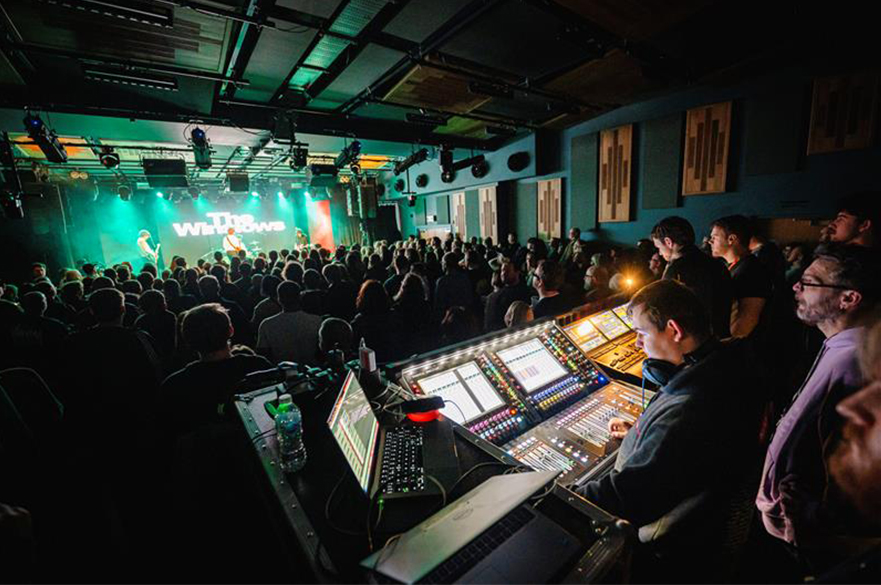This course is in Clearing
Offers from 48 tariff points
About this course
This cutting-edge Event Production foundation degree will give you the opportunity to study in a real-world live event venue, training with professionals and working with industry-standard hardware and software. By the end of the course you’ll have gained the technical, organisational, creative and professional skills you need to work successfully within the technical events industry.
You’ll learn the fundamentals of working with industry relevant live event technology, as well as how to build and operate lighting and sound reinforcement systems, from the basics in year 1 to more advanced skills in year 2.
You’ll learn in our music and live events hub, Metronome, designed by world-renowned audio architects White Mark Ltd – who have designed studios for clients including Jay-Z and Damon Albarn. You’ll also have access to a 400-capacity live venue, and a 93m2 events production workshop space, as well as PA systems from manufacturers, including Nexo, Martin Audio and L’Acoustics and a range of generic and moving lighting technology from Robe, Clay Paky and Martin.
Your tutors are all industry professionals still out there working in the industry whilst also being qualified lecturers – so you’re learning from people that live it! We have cross-collaborations with other course disciplines such as Music Performance, Film Production, and Content Creation students to give you a broad and exciting experience.
What you’ll study
This cutting-edge course will give you the opportunity to study in a real-world live event venue, training with professionals and working with industry-standard hardware and software.
This industry-focused course will give you the chance to learn about a broad range of disciplines in the live and technical events sector, including:
- Lighting and stage design
- Live sound reinforcement
- Sound theory and acoustics
- Electrical principles
- Equipment maintenance and repair
- Visual Effects (VFX)
- Live event planning.
Lighting Technology (40 credit points)
Stage lighting is one of the most fundamental technologies in use to enhance the audience experience and support the performance of live events. This module will introduce you to the application of a diverse range of technologies in use, and their underlying scientific principles.
You will study the use of generic and intelligent lighting fixtures from a range of manufacturers, whilst also developing a working knowledge of distribution, dimming and control hardware and software. You will investigate current health and safety legislation and implement practical skills during industry practice focused workshops and live events. You will also gain knowledge of the historical developments in lighting technology and how that informs current industry standards and working practices.
Sound Technology (40 credit points)
This module aims to develop your understanding of sound reinforcement through the study of the theoretical and practical aspects of live sound. You will study the physical properties of sound and how they relate to sound reinforcement and will explore analogue and digital technologies. You'll put your knowledge into practice in practical live sound settings throughout the year.
Equipment, Maintenance and Repair (20 credit points)
An understanding of the principles of electrical systems is fundamental to anyone working within technical roles within the live event sector. It is of paramount importance that work in industry is carried out with electrical safety at the forefront. This module aims to equip you with a range of practical skills for fault finding, maintenance and repair of event technology. You will learn the fundamental principles of electronics, practical soldering techniques and investigate recognised industry standards and practices.
The Live Events Industry (20 credit points)
Working in the live event industry requires an awareness of the various types of job roles and career paths, and the historical, cultural and legislative changes that have helped shape the live event sector. This module encourages you to carry out research into the live event industry and analyse current trends and legislation, in order to gain a thorough understanding of your chosen sector. You will also develop your future employment prospects by engaging in basic work-related activities.
Production Design and Technology (60 credit points)
Production design focuses on all visual elements of an event, incorporating lighting and video technology, and often set design. With the continuous development of lighting and video technology, the roles of lighting or video designer often merge and the requirement to have skills in both areas of the industry is expected. In this module you will explore all aspects of production design and technology.
You will develop skills in lighting programming, video distribution systems, use of projection and LED screen technology, as well as looking at the design process, skills in 3D visualisation and the socio economic responsibilities of a designer.
You will also explore advanced lighting skills included the use of rigging and lifting equipment and calculating safe working practice when designing systems. You will develop a portfolio of skills in various different lighting and video design and operation software, which will then be put into practice in a final design project.
Advanced Sound Technology (40 credit points)
You will further your knowledge of sound theory and audio technology through the application of the design of different sound reinforcement systems. You will look at the connection between mathematical data to study the behaviour of sound in live venues, investigate loudspeaker designs and carry out sound measurements and calculations.
This module also has a strong emphasis on practical live sound engineering skills, and you will have the opportunity to develop and hone your skills in the live sound environment using industry-standard software and hardware.
Future You (20 credit points)
You are are the key to your own success! In this module you will investigate and develop your professional identity in terms of attributes, beliefs, values, motives, and experiences. You will develop professional integrity and a career identity.
This module encourages you to carry out research into employability and entrepreneurship and analyse current industry practices, job roles and technical skills required in order to gain a thorough understanding of the events sector. Throughout and during the assessment process you will actively partake in transformative practice, effective review and evaluation of yourself.
We regularly review and update our course content based on student and employer feedback, ensuring that all of our courses remain current and relevant. This may result in changes to module content or module availability in future years.
How you're taught
Classes are a mixture of practical workshops, classroom sessions, seminars and tutorials. Practical workshops take place in our live event production space, giving you a significant amount of regular, weekly hands-on practical time. During these sessions you’ll develop your expertise, working alongside expert tutors who are active professionals.
Our live events students are regularly out working on productions at venues across the region, including:
- Nottingham Splendour Festival
- Nottingham Motorpoint Arena
- The Hockley Hustle Festival
- The Bodega
- Nottingham Castle.
Showcase
You will be given the opportunity to exhibit your work during your time at NTU to members of the creative industries.
How you're assessed
There is a varied range of assessment methods throughout the course, which includes:
- practical observations
- portfolio work
- technical reports
- critical evaluations
- visual and verbal presentations.
Careers and employability
Employability is a key focus of this course, with modules focusing specifically on enhancing your employability.
This course will prepare you to work in the live events sector, in areas such as lighting design, sound engineering, VFX, equipment technicians and event management.
Connecting with industry
Industry professionals will visit the course to guest lecture and share their experiences. Live projects will help you to gain real experience of the industry, make contacts and build your portfolio and CV.
Work placement and internship opportunities
You will be actively encouraged and supported to undertake informal work experience and professional practice in addition to your studies.
Our teaching staff, including part-time lecturers who are professionally active, help and support students in directing them towards work placement and professional practice opportunities.
YouFirst – working with our Employability Team
Studying a degree at a popular university has many benefits, none more so than having access to a large employability team.
Our friendly, experienced careers consultants will work closely with you at every stage of your career planning, providing personal support and advice you won't find in a book or on the internet. You can benefit from this at any time during your studies and up to three years after completing your course.
Campus and facilities
You’ll get to learn your trade in facilities that operate public-facing events every week of the year.
In Metronome you’ll find some amazing facilities, jam packed with recording studios, rehearsal rooms, performances spaces, and a 400-capacity venue. You will be using industry standard equipment, the kind of equipment you’re going to see the professionals using. That’s audio equipment from Allen & Heath, L’Acoustics, Digico, Martin Audio, Nexo, Shure and Audix. Lighting from Avolites, MA, Martin, Robe and Clay Paky.
Providing more event experience opportunities is Confetti X; a 14,000 sq ft complex on the Confetti campus kitted out with world-class facilities and technology for esports and other emerging technologies. It’s here where you’ll have the chance to work on esports tournaments and a range of corporate events.
Entry requirements
This course is in Clearing
Looking for a place in Clearing? We are accepting application and would love to hear from you!
UK students
This course is in Clearing
Looking for a place in Clearing? We are accepting applications and would love to hear from you!
Clearing requirements
From 48 UCAS tariff points from up to qualifications.
To discuss our entry requirements and see what we can offer you, call us now on +44 (0)115 848 6000. Alternatively, if you already have your qualifications, apply online via our Clearing Application form.
Preparing for results day? Beat the queue and sign up for NTU Priority for up-to-date information about all things Clearing. You’ll get an offer ahead of Clearing, subject to you achieving the required grades on results day.
Additional requirements for UK students
Other qualifications and experience
We may also consider credits achieved at other universities and your work/life experience through an assessment of prior learning. This may be for year one entry, or beyond the beginning of a course where applicable, for example, into year 2. Our Recognition of Prior Learning and Credit Transfer Policy outlines the process and options available for this route.
Other qualifications and experience
NTU welcomes applications from students with non-standard qualifications and learning backgrounds, either for year one entry or for advanced standing beyond the start of a course into year 2 or beyond.
We consider study and/or credit achieved from a similar course at another institution (otherwise known as credit transfer), vocational and professional qualifications, and broader work or life experience.
Our Recognition of Prior Learning and Credit Transfer Policy outlines the process and options available for this route. If you wish to apply via Recognition of Prior Learning, please contact the central Admissions and Enquiries Team who will be able to support you through the process.
Getting in touch
If you need more help or information, get in touch through our enquiry form.
International students
This course is in Clearing
Looking for a place in Clearing? We are accepting applications and would love to hear from you!
Clearing requirements
From 48 UCAS tariff points from up to qualifications.
To discuss our entry requirements and see what we can offer you, call us now on +44 (0)115 848 6000. Alternatively, if you already have your qualifications, apply online via our Clearing Application form.
Preparing for results day? Beat the queue and sign up for NTU Priority for up-to-date information about all things Clearing. You’ll get an offer ahead of Clearing, subject to you achieving the required grades on results day.
This course is not suitable for International applicants.
Additional requirements for international students
There are no additional requirements for this course.
English language requirements
View our English language requirements for all courses, including alternative English language tests and country qualifications accepted by the University.
If you need help achieving the language requirements, we offer a Pre-Sessional English for Academic Purposes course on our City campus which is an intensive preparation course for academic study at NTU.
Other qualifications and experience
If you have the right level of qualifications, you may be able to start your Bachelors degree at NTU in year 2 or year 3. This is called ‘advanced standing’ entry and is decided on a case-by case basis after our assessment of your qualifications and experience.
You can view our Recognition of Prior Learning and Credit Transfer Policy which outlines the process and options available, such as recognising experiential learning and credit transfer.
Sign up for emails
Sign up to receive regular emails from the International Office. You'll hear about our news, scholarships and any upcoming events in your country with our expert regional teams.
Getting in touch
If you need advice about studying at NTU as an international student or how to apply, our international webpages are a great place to start. If you have any questions about your study options, your international qualifications, experience, grades or other results, please get in touch through our enquiry form. Our international teams are highly experienced in answering queries from students all over the world.
Policies
We strive to make our admissions procedures as fair and clear as possible. To find out more about how we make offers, visit our admissions policies page.










